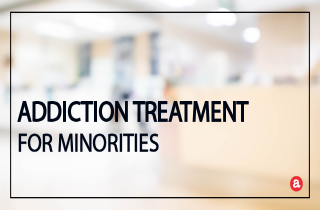Minority addiction treatment barriers
Minorities typically face a number of barriers when entering addiction treatment or trying to complete addiction treatment. Some of these barriers may affect all demographics, while others may be specific to certain minorities. A list of some of the common minority addiction treatment barriers are listed below.
- Career responsibilities
- Communication difficulties
- Cultural attitudes about mental health problems or addiction
- Discrimination or rejection during addiction treatment
- Family responsibilities
- Financial difficulties
- Lack of insurance
- Shame or stigma surrounding addiction or addiction treatment
Minorities and addiction treatment
Addiction treatment for minorities should have a specific focus on the needs of populations served. Different types of addiction treatment that can benefit American minorities include:
- Outpatient addiction treatment
- Partial inpatient treatment
- Residential inpatient addiction treatment
Minority drug addiction treatment
Minority addiction treatment typically follows a few basic stages. The basic stages of minority drug addiction treatment are:
1. Evaluation and assessment
Anyone entering addiction treatment must first go through an evaluation and assessment to determine the severity of their addiction, diagnose any underlying mental health issues, and develop an addiction care plan.
2. Detox
Medical detox is often strongly recommended for people who are drug or alcohol dependent. This supervised medical process allows addicts to withdrawal safely and comfortably, and greatly minimizes the risk of relapse during this crucial period.
3. Psychotherapy and pharmacotherapy
A number of methods are used during addiction treatment for minorities, including individual behavior therapy, group therapy, family therapy, and pharmacotherapy. Prescription medications include antidepressant, anti-anxiety medications, opiate substitution therapies, or medications which address specific withdrawal symptoms.
4. Aftercare
Addiction treatment aftercare is a crucial step that should not be overlooked. Addiction treatment aftercare often involves periodic outpatient therapy sessions and possibly a stay in a halfway house. Vocational training, job placement, and/or community support are also considered during addiction aftercare.
Addicted minorities
Addicted minorities should never hesitate to ask for addiction treatment help if they need it. Primary physicians are excellent people to turn for help overcoming addictions. Those who don’t have primary physicians can speak to professionals in hospitals or community clinics. Some employers and most schools also offer addiction help as well.
The Substance Abuse and Mental Health Services Administration (SAMHSA) is also a great resource for addicted minorities. The substance abuse treatment facility locator on the SAMHSA website is particularly helpful. This tool can be used to find local addiction treatment facilities in your area that offer specific services, such as payment assistance and special language services.
Minority addiction questions
Finding addiction treatment can be a daunting task. If you or a loved one are ready to go into addiction treatment, but aren’t quite sure where to turn, feel free to leave a comment below. We’ll answer any addiction treatment questions that you may have quickly, and hopefully get you onto the right path.









Related Posts